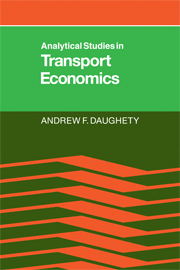1 - Analytical transport economics – structure and overview
Published online by Cambridge University Press: 07 October 2011
Summary
The nature of the subject has made it essential to the convenient and concise demonstration of the principles which are the objects of the research, to admit the introduction of mathematical formula throughout the investigation.
Charles Ellet, Jr., An Essay on the Laws of Trade (1839)Since Charles Ellet's insightful analysis of optimal tariffs for a waterway in a competitive environment, a rich and extensive literature has developed involving the application of microeconomic theory and analysis to issues and policies in the economics of transportation, via the use of mathematical and statistical techniques. This book contributes to this literature in three ways. First, all of the chapters are concerned with the analysis of current issues: questions of industry productivity, of economies of density and scale, of pricing and competition, of the structure of technology, and of the prediction of equilibrium. Second, each of these essays endeavors to extend and apply microeconomic theory to its particular issue. This often involves an extension of modeling and statistical techniques in the process. Furthermore, in pursuing this second aspect the authors of the essays have been able to present their research design and methodology in more detail than is usually possible in a journal article. Thus a third contribution is to lower the costs of entry for nonspecialists into this field.
- Type
- Chapter
- Information
- Analytical Studies in Transport Economics , pp. 3 - 26Publisher: Cambridge University PressPrint publication year: 1986



